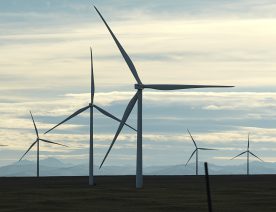
October 23, 2025
Most Americans are concerned about the environmental consequences of Artificial Intelligence (AI), and are nearly twice as likely to say AI will do more to hurt than help the environment, according to a new survey from The Associated Press-NORC Center for Public Affairs Research and the Energy Policy Institute at the University of Chicago (EPIC). Seventy-two percent say they are at least somewhat concerned, including 41% who say they are very or extremely concerned, which surpasses perceptions of the environmental impact of other industries including cryptocurrency (29% very or extremely concerned), meat production (29%), and air travel (23%).
Looking ahead, Americans are more likely to believe that AI will be harmful rather than helpful to society, the economy, and the environment over the next decade. However, views are more mixed when it comes to how AI might affect them personally.
The survey also explores public attitudes towards climate change, energy policy, and electric vehicles (EVs). While 37% say they are at least somewhat likely to purchase an EV the next time they buy a car, cost remains a major barrier. About 8 in 10 Americans across income levels cite the upfront price as a reason they would not purchase an EV. Cost concerns also shape preferences between American-made EVs over those made in China. When presented with a choice between purchasing a more expensive EV made in the United States and a less expensive vehicle made in China, the majority of Americans prefer the domestic option if the price difference is $2,000 or less. Preference for the American-made car declines as the price difference between the options rises.
Over the past year, 91% of Americans say they have experienced an extreme weather event such as unusually hot or cold days, poor air quality, hurricanes, or floods. Those who have experienced extreme weather events firsthand are more likely to believe that climate change is happening and that it is caused mostly by human activity compared to those who have not experienced extreme weather. About 9 in 10 of those who have experienced extreme weather recently believe that climate change was a contributing factor.
While 74% of Americans believe the federal government should play a major role in helping rebuild communities affected by natural disasters, only about a quarter have confidence that the Federal Emergency Management Agency (FEMA) is prepared to respond to one in their neighborhood. Both Democrats and Republicans share little confidence in FEMA’s preparedness. Confidence is higher for other groups including local first responders (56%), the national weather service (39%), and local weather forecasters (39%).
This nationwide poll was conducted by The AP-NORC Center and the Energy Policy Institute at the University of Chicago (EPIC) from September 2-18, 2025, using TrueNorth®, which combines a sample from AmeriSpeak, the probability-based panel of NORC at the University of Chicago, with a non-probability panel sample. Online and telephone interviews using landlines and cell phones were conducted with 3,154 adults. The margin of sampling error is +/- 2.4 percentage points.
- Suggested Citation: The AP-NORC Center for Public Affairs Research. (October, 2025). https://apnorc.org/projects/epic-climate-change-2025/







